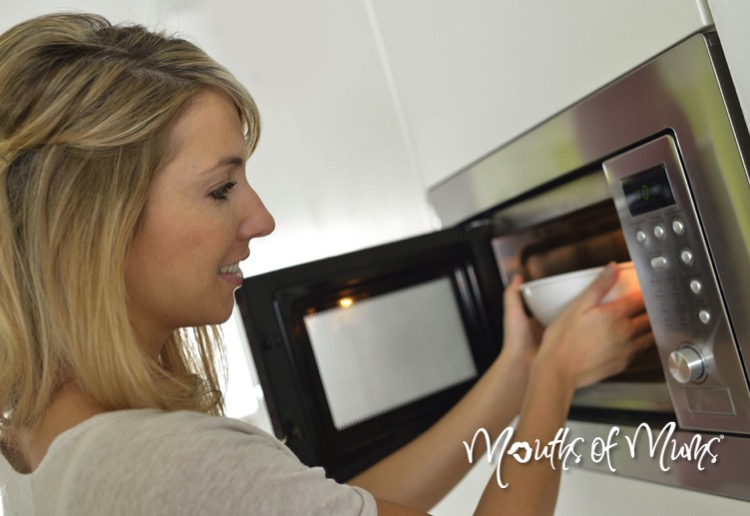In my last blog post we tackled 3 simple ways to remove some nasties from your home. This time we’re delving deeper into the toxic plastics in your kitchen.
So I have 3 more little suggestions to get your on the road to a safer home today.
Now after reading part 1 you’ve hopefully stopped using cling wrap to cover your food in the microwave – which is a great step. But the nasties that leach out of cling wrap into your food aren’t only found in plastic wrap. They are found in most plastic containers as well.
There are 3 main ways that these toxins can leach out into your food so my aim is to get you to quit them all – not as scary or as hard as it sounds I promise you. And these steps will make a HUGE difference to the number of toxins you and your loved ones are exposed to every day.
1) Never heat or microwave food or drinks in any plastic containers.
That’s because the nasty chemicals that leach out of the plastic do so much more easily, and more quickly, at extreme temperatures.
Ditto for making hot drinks in plastic cups also. Oh, and if possible, remove your plastic coffee lid before drinking your takeaway drinks.
2) Now for the same reason I am also suggesting that you don’t freeze in plastic either.
The extreme cold has a simular affect on plastics.
So what are the alternatives then I hear you ask?!?
Use glass, ceramic or stainless steel instead.
The first 2 are obviously more suitable for the microwave. I’m often heard telling my workmates to microwave their lunch on a ceramic plate rather than in the plastic container they brought it to work in.
There are some great toughened glass and stainless steel containers with plastic lids that are perfect alternatives. That way your lunch can go from bag to microwave to table, all in the one container. Just remove the lid before heating and, ideally, don’t fill it to the top so your food doesn’t touch the lid.
3) Finally please don’t store acidic food such as tomatoes and pineapple in plastic.
Again the leaching increases when exposed to acid.
The above-mentioned containers are also an easy replacement for plastics here. Now I am a big fan of reusing glass jars and bottles and actually happily spend a bit more for a product that comes in a glass jar knowing I wil reuse it again and again. These are perfect for storing things such as leftover pasta sauce.
Now let’s discuss how these tips translate to mums in particular.
My suggestion would be to never heat plastic baby bottles full stop. As a safer alternative when warming breast milk or water for formula use a glass container or glass baby bottle. If you only have plastic baby bottles it is much safer to transfer the liquid into this once warmed.
For older children replace plastic drink bottles with stainless steel ones, these come with a variety of lid options so should be an easy switch.
And for mums who love to make big batches of baby food and freeze the excess simply choose silicone ice cube trays, or the like, rather than plastic ones.
And finally bamboo makes the perfect alternative to plastic cutlery, plates, bowls and cups.
There we go another 3 easy ways to fewer chemicals in your home.
Stay tuned for more ways to reduce the toxins in your home coming soon.
Do you have a simple way to remove the nasty chemicals at your place? Please share in the comments below.
Image courtesy of Shutterstock.com




















1:35 pm
7:01 pm
8:37 pm
-

-
-
SharonBHall replied
- 07 Jul 2016 , 5:10 pm
Reply9:05 pm
-

-
-
SharonBHall replied
- 07 Jul 2016 , 5:11 pm
Reply7:02 pm
10:27 pm
-

-
-
SharonBHall replied
- 08 Jul 2016 , 2:01 pm
Reply9:50 pm
9:29 am
-

-
-
SharonBHall replied
- 25 Apr 2016 , 3:37 pm
Reply9:12 am
-

-
-
SharonBHall replied
- 25 Apr 2016 , 3:31 pm
Reply8:05 pm
-

-
-
SharonBHall replied
- 25 Apr 2016 , 3:33 pm
Reply11:06 am
-

-
-
SharonBHall replied
- 25 Apr 2016 , 3:43 pm
Reply5:57 am
-

-
-
SharonBHall replied
- 25 Apr 2016 , 3:46 pm
Reply4:01 am
-

-
-
SharonBHall replied
- 25 Apr 2016 , 3:47 pm
Reply8:32 pm
-

-
-
SharonBHall replied
- 25 Apr 2016 , 3:39 pm
Reply8:23 pm
-

-
-
SharonBHall replied
- 25 Apr 2016 , 3:50 pm
Reply3:07 pm
-

-
-
SharonBHall replied
- 18 Apr 2016 , 2:40 pm
Reply12:01 pm
-

-
-
SharonBHall replied
- 25 Apr 2016 , 3:51 pm
Reply11:17 am
-

-
-
SharonBHall replied
- 20 Apr 2016 , 11:14 am
Reply9:37 pm
-

-
-
SharonBHall replied
- 11 Apr 2016 , 10:30 am
Reply8:30 pm
-

-
-
SharonBHall replied
- 20 Apr 2016 , 11:21 am
Reply- 1
- 2
- 3
- »
Post a commentTo post a review/comment please join us or login so we can allocate your points.